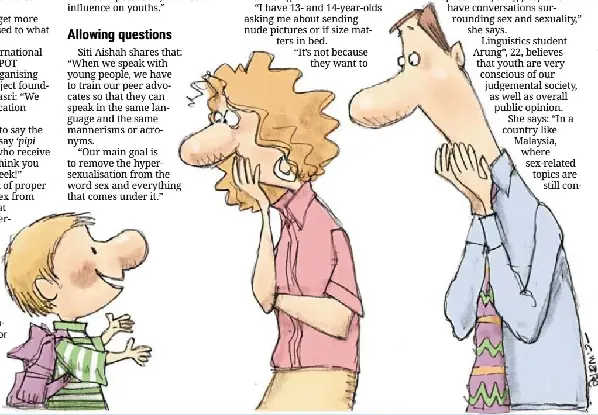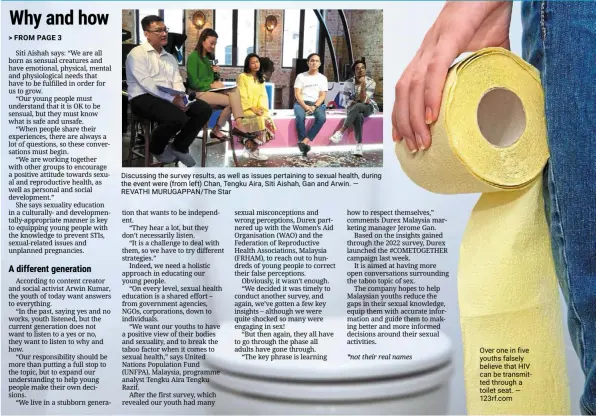A survey finds that the number of young adult Malaysians having sex has doubled since 2016, but their knowledge is shockingly lacking.
MALAYSIAN youth are a curious bunch, but they are still pretty ignorant when it comes to many sexual health matters.
Despite a twofold increase in youth engaging in sexual intercourse over the past six years (from 18.8% to 35.4%), a third do not know a woman can get pregnant the first time she has sex or during her period, and over one in five (22%) believe that mosquitoes can transmit sexually-transmitted infections (STIS)!
As a generation that is online most of the time and is exposed to much sexual content in pop culture, it’s not really surprising that 60% learnt about sex from online articles or watching movies and videos, while 62% had sex for the first time at the age of 22 or younger.
These were some of the findings of the second nationwide Sexual Health and Intimate Wellness Survey 2022 conducted by Durex Malaysia.
The online survey carried out from April to May involved 1,089 Malaysians between the ages of 18 and 30.
The first such survey was done in 2016 and the latest results continue to astound experts.
For example, 23% of the respondents think HIV (human immunodeficiency virus) can be transmitted through a toilet seat, which is an increase from 10% in 2016.
And even though 40% of youths felt pressured to have sex, almost half (42%) did not use a condom or other forms of birth control, which led to one out of 20 women experiencing an unwanted pregnancy.
Space to learn needed

Growing peer pressure to have premarital sex plays a major role in sexual and reproductive health-related decision-making among youths.
Since sexuality education is still considered a sensitive topic here, our youths are struggling to find a space to talk openly and find the right answers.
“When our parents asked our grandparents about sex, they didn’t know how to answer, and similarly, our parents don’t know how to answer their kids.
“So, how can they have conversations about sex when they themselves are unsure about many things?” asks counsellor and sex therapist Chan Fun Shin.
He adds that most youth are embarrassed or uncomfortable saying the words vagina or penis.
“Role-play with your friend by saying those words to start a conversation about sex.
“Eventually, you will get more relaxed and more exposed to what safe sex is,” he advises.
Adds Soroptimist International Club of Petaling Jaya’s SPOT (Soroptimist Puberty Organising Toolkit) Community Project founder Siti Aishah Hassan Hasri: “We suffer a lot of communication ‘fuzziness’ in Malaysia.
“We don’t even want to say the word penis; instead we say ‘pipi saya gatal’ and people who receive the information might think you are referring to your cheek!”
One result of this lack of proper communication about sex from trusted authorities is that many people turn to alternate sources of information about the topic.
As mentioned earlier, 60% of Malaysian youth turn to online articles, movies and videos to today’s younger generation don’t accept “yes” or “no” answers; they want to know why and how, especially when it comes to the birds and the bees. — tns learn about sex.
Nearly half (48%) turn to pornography.
Even more concerning is that one in three believe that the sex shown in pornography is normal.
“Although pornography tends to be viewed in a bad light, I think it plays a significant role in educating the youth concerning sex,” says engineering student Sharvendran Selvan, 22.
He adds though that: “It is a no-brainer that the sexual activity shown in pornography is beyond normal human capability and far from the reality.
“However, it is in our youths’ hands whether they take it positively as a mere source of knowledge, or negatively by implementing everything that they have seen.”
On the other hand, linguistics student Priya*, 23, opines: “Pornography is not the right place to learn about sex as they practice unprotected and unhygienic sex, and could potentially be a bad influence on youths.”
Allowing questions
Siti Aishah shares that: “When we speak with young people, we have to train our peer advocates so that they can speak in the same language and the same mannerisms or acronyms.
“Our main goal is to remove the hypersexualisation from the word sex and everything that comes under it.”
Established in 2015, SPOT uses carefully-designed modules to equip girls of all ages with the confidence and resilience to make informed decisions regarding their well-being.
“I have 13- and 14-year-olds asking me about sending nude pictures or if size matters in bed.
“It’s not because they want to have sex, but because they are curious.
“We want to be able to talk about gender and sex very openly and respectfully.
“Our business is providing safe spaces for young people to have conversations surrounding sex and sexuality,” she says.
Linguistics student Arung*, 22, believes that youth are very conscious of our judgemental society, as well as overall public opinion. She says: “In a country like Malaysia, where sex-related topics are still considered taboo in many places, it is hard not to be judged by the public and this is what prevents youths from seeking help.”
She thinks that sex-related concerns among youth should be addressed via proper sex education in schools, as well as via social media.
“The government should provide a proper platform for the youth where they can learn accurate information, especially as taboos about sex mean this topic is not addressed enough among our people.”
She adds: “It is a well-known fact that youths are constantly on social media such as Tiktok and Instagram.
“Thus, addressing and normalising topics related to sex on such platforms would be efficient and effective.”
Language student Wong*, 22, agrees, suggesting a platform on social media that is easily accessible and where youth can anonymously post questions.
“As youth nowadays are very timid, regularly organising an anonymous Q&A (question and answer) session with professionals would help in clearing their doubts,” she says.
To form a strong, long-lasting bond, intimacy is a key ingredient – it’s what human beings crave in order to create a safe, loving and happy relationship.
Why and how ?
Siti Aishah says: “We are all born as sensual creatures and have emotional, physical, mental and physiological needs that have to be fulfilled in order for us to grow.
Discussing the survey results, as well as issues pertaining sexual health, during the events were (from left), Chan, Tengku Aira, Siti Aishah, Gan and Arwin - REVATHI MURUGAPPAN/The Star

Over one in five youths falsely believe that HIV can be transmitted through a toilet seat. — 123rf.com
“Our young people must understand that it is OK to be sensual, but they must know what is safe and unsafe.
“When people share their experiences, there are always a lot of questions, so these conversations must begin.
“We are working together with other groups to encourage a positive attitude towards sexual and reproductive health, as well as personal and social development.”
She says sexuality education in a culturally- and developmentally-appropriate manner is key to equipping young people with the knowledge to prevent STIS, sexual-related issues and unplanned pregnancies.
A different generation
According to content creator and social activist Arwin Kumar, the youth of today want answers to everything.
“In the past, saying yes and no works, youth listened, but the current generation does not want to listen to a yes or no, they want to listen to why and how.
“Our responsibility should be more than putting a full stop to the topic, but to expand our understanding to help young people make their own decisions.
“We live in a stubborn generation that wants to be independent.
“They hear a lot, but they don’t necessarily listen.
“It is a challenge to deal with them, so we have to try different strategies.”
Indeed, we need a holistic approach in educating our young people.
“On every level, sexual health education is a shared effort – from government agencies, ngos, corporations, down to individuals.
“We want our youths to have a positive view of their bodies and sexuality, and to break the taboo factor when it comes to sexual health,” says United nations Population Fund (UNFPA), Malaysia, programme analyst Tengku Aira Tengku Razif.
After the first survey, which revealed our youth had many sexual misconceptions and wrong perceptions, Durex partnered up with the Women’s Aid Organisation (WAO) and the Federation of Reproductive Health Associations, Malaysia (FRHAM), to reach out to hundreds of young people to correct their false perceptions.
Obviously, it wasn’t enough. “We decided it was timely to conduct another survey, and again, we’ve gotten a few key insights – although we were quite shocked so many were engaging in sex!
“But then again, they all have to go through the phase all adults have gone through.
“The key phrase is learning how to respect themselves,” comments Durex Malaysia marketing manager Jerome Gan.
Based on the insights gained through the 2022 survey, Durex launched the #COMETOGETHER campaign last week.
It is aimed at having more open conversations surrounding the taboo topic of sex.
The company hopes to help Malaysian youths reduce the gaps in their sexual knowledge, equip them with accurate information and guide them to making better and more informed decisions around their sexual activities.
*not their real names
You can say no
ALTHOUGH
60% of Malaysian youths perceive sex to be pleasurable, two out of five
continue to have sex despite it not being pleasurable, according to the
2022 Sexual Health and Intimate Wellness Survey.And one in four found
their first sexual
Related:













